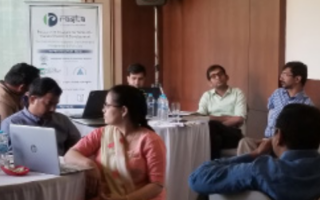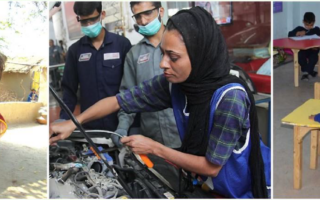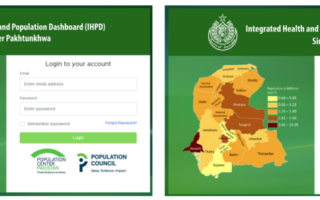
Under a partnership with the United Nations Population Fund (UNFPA), the Population Council is engaged in policy advocacy, technical assistance, community outreach, and research activities.
UNFPA is supporting the Population Council in high-level policy dialogue and systematic advocacy to generate and mobilize political support to effectively prioritize and increase resource investments in providing universal access to basic and essential reproductive health services. Working with multiple key stakeholders in the public sector at the federal and provincial levels, the Population Council has been able to effectively conduct policy advocacy and ensure that population issues are an important agenda item for policymakers. The Parliamentary Forum on Population (PFP), launched in March 2020, is the only multiparty platform on population comprising provincial and federal legislators. The PFP has earned global recognition and become a member of the Global Parliamentary Alliance for Health, Rights, and Development.
Along with policy advocacy, the Population Council with UNFPA’s support has carried out initiatives for the effective involvement of civil society and media, to enhance the accountability of all stakeholders responsible for implementation of the Council of Common Interests (CCI) action plan on population stabilization. The Population Council developed an accountability framework for civil society organizations to monitor implementation of CCI decisions. The tool facilitates CSOs in periodic assessment of national and provincial governments’ initiatives and achievements, and in advocacy to address gaps. This monitoring system will help to ensure that family planning remains an important policy agenda. Similarly, a media coalition comprising journalists across Pakistan is provided with evidence-based information and data to create urgency around the seriousness of the population issue and its impact on multiple dimensions of Pakistan’s development.
The Population Council has supported public-sector decisionmaking and policy design by developing evidence, guidelines, and frameworks. Initiatives such as the district ranking tool and the political party report card strengthen the capacity of policymakers to use data and evidence in decisionmaking. Initiatives such as the DoH and PWD structural review, the UNFPA-NIDI Resource Flows survey, and the Innovative Model FP scale-up also build the capacity of the public sector to utilize research and evidence and to build institutional strength to meet population goals.
The UNFPA and Population Council collaboration aims to strengthen the government’s capacity both at federal and provincial levels to mainstream population dynamics into development planning at all levels and across sectors on core population and development indicators. Initiatives like the inclusion of population and development in the training programs of federal and provincial civil servants have helped build the capacity of the public sector to collect, analyze, and consume data for evidence-based program design.
The Population Council, with UNFPA’s support, also plays an important role in ensuring public awareness of population issues and understanding of family planning and reproductive health services. A key success in this regard was the development of a new national narrative on population. The new narrative of TAWAZUN, which calls for creating a balance between resources and population, was incubated at the Population Council Pakistan office after an extensive consultative process. The new national narrative is in line with the rights-based approach to voluntary family planning and the Islamic ethos of balance and moderation, and encourages parents to determine the size of their family based on their resources. The narrative was endorsed and adopted by the federal and provincial governments, CSOs, and religious leaders. A postage stamp was launched on the 2020 World Population Day by the government of Pakistan promoting the new narrative of balance (Tawazun).




